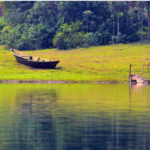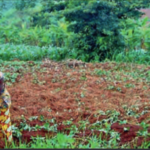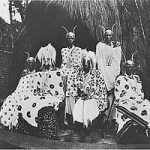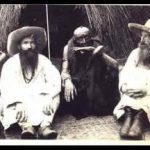IV. Stapple Crops, Cash Crops And Other Cultivation
The economy of the people of Remera is one of subsistence.
Historically and geographically, Ruanda has been isolated. Its only link with a money economy is that brought in by the Europeans at the turn of the century and that is very tenuous. Both the Germans and the Belgians have attempted to link the country to the world market economy, the former by tapping it as a labor reservoir, and the latter by introducing cash crops. Both were largely unsuccessful. Throughout Africa governments have complained of the difficulty of having the local populations increase their agricultural production by more modem methods: Ruanda is no exception.
The story of the Agricultural Service is one of work and failure to have new methods or new crops accepted.For coffee especially, everything has been tried short of handing the natives the whole crop ready to be sold.
Remera is not excepted from the vicissitudes of a changing world, but it is far from the directives of a geographically remote administration. Moreover, because of this very geographical isolation of the region, Remera could not and did not participate with Central Ruanda in the type of economic exchanges with the Congo.On the contrary, its relationships were directed most frequently north to Uganda and, less frequently to Tanganyika.
To say that the economy of Remera is one of absolute subsistence would be an exaggeration, but if Remera were suddenly cut off entirely from the world market economy, it would have little difficulty in adjusting itself to absolute independence. As a matter of fact, the only real dependence of the community on the kingdom is political and, although this has necessarily some wider economic implications, these links are of such a nature as to be readily severed in the extreme hypothetical circumstances suggested above.
The only cash the peasants need is that to pay their head-tax. They buy and use only the very generalized agricultural tools, made in Europe or South Africa, which existed previously in their own culture: the hoe and the machete, which they could return to manufacturing again at the local level, if they had to. Nor would clothing offer any problem, as only fifteen years ago the people of Eastern Ruanda still ware skins and bark cloth. There are few other tools at all and none used in agriculture that could not be acquired or be made locally, such as a winnowing basket, storage baskets, and a stout stick for a flail.
https://uk.amateka.net/iv-stapple-crops-cash-crops-and-other-cultivation/https://uk.amateka.net/wp-content/uploads/2021/03/farmers-rwanda.pnghttps://uk.amateka.net/wp-content/uploads/2021/03/farmers-rwanda-150x150.pngModel CitizenshipThe economy of the people of Remera is one of subsistence. Historically and geographically, Ruanda has been isolated. Its only link with a money economy is that brought in by the Europeans at the turn of the century and that is very tenuous. Both the Germans and the Belgians have...BarataBarata rpierre@ikaze.netAdministratorAMATEKA | HISTORY OF RWANDA




